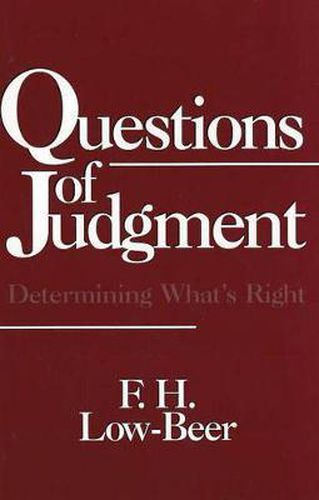Readings Newsletter
Become a Readings Member to make your shopping experience even easier.
Sign in or sign up for free!
You’re not far away from qualifying for FREE standard shipping within Australia
You’ve qualified for FREE standard shipping within Australia
The cart is loading…






This book helps to explain what we mean when we say that an issue, a question, or a situation is a matter of judgement . Author F.H. Low-Beer opens a new window on cognition by examining judgement as exercise, an aspect not previously attempted in a systematic way. Problems ordinarily dealt with in practical reasoning, decision theory, and interpretation are examined here in a fascinating new light. Beyond its new theoretical insights, the singular contribution of this book lies in its examination of the overlooked place of judgement in the everyday world. Low-Beer looks at what is foundational in society, the courts, the professions, politics, and commerce fields of practice with which he is very familiar and concludes that the exercise of judgement is a defining characteristic of professionalism. The author’s interdisciplinary approach will nudge readers of philosophy, legal and political theory, as well as decision theory to connect the academic with the wider world.
$9.00 standard shipping within Australia
FREE standard shipping within Australia for orders over $100.00
Express & International shipping calculated at checkout
This book helps to explain what we mean when we say that an issue, a question, or a situation is a matter of judgement . Author F.H. Low-Beer opens a new window on cognition by examining judgement as exercise, an aspect not previously attempted in a systematic way. Problems ordinarily dealt with in practical reasoning, decision theory, and interpretation are examined here in a fascinating new light. Beyond its new theoretical insights, the singular contribution of this book lies in its examination of the overlooked place of judgement in the everyday world. Low-Beer looks at what is foundational in society, the courts, the professions, politics, and commerce fields of practice with which he is very familiar and concludes that the exercise of judgement is a defining characteristic of professionalism. The author’s interdisciplinary approach will nudge readers of philosophy, legal and political theory, as well as decision theory to connect the academic with the wider world.